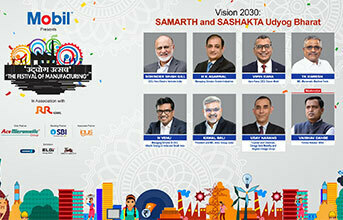
After the felicitation of the Champions of Manufacturing and the keynote address by Dr Bhagwat Karad, the Festival of Manufacturing kickstarted with its first-panel discussion on Vision 2030: SAMARTH and SASHAKTA Udyog Bharat, held at Bhim Hall. The panel comprised Managing Director of Grasim Industries - H K Agarwal; Vipin Rana, CEO, Exxon Mobil Lubricants Pvt Ltd; TK Ramesh, MD, Micromatic Machine Tools; N Venu, Managing Director & CEO, Hitachi Energy in India, and South Asia; Kamal Bali, President and MD, Volvo Group, India; and Uday Narang, Founder and Chairman, Omega Seiki Mobility and Anglian Omega Group.
The Festival of Manufacturing was sponsored by Mobil, in association with RR Kabel, Gold Partner Ace Micromatic, banking Partner SBI Bank, Associate Partner igus and supported by the Ministry of MSME, Ministry of Heavy Industries and Ease of Doing Business.
That said, the power-packed panel discussion moderated by Vaibhav Dange, Former Advisor, NHAI, deliberated on how a thriving manufacturing sector could potentially be the most critical building block for India's economic growth in the coming year. It also focussed on how global companies are re-configuring their value chains and sourcing manufacturing footprints.
The discussion started with Vaibhav Dange, Former Advisor, NHAI, talking about the Hon'ble Prime Minister's continuous emphasis on his pet project - ‘Make in India' and how this campaign would be crucial for the country's economic growth. He also mentioned the tangible target that the Hon'ble PM has given to the manufacturing industry of increasing their contribution to the GDP from 16 per cent to 25 per cent. However, he categorically stated that achieving such a focused target would need attracting investments, which will also be crucial in accomplishing the five trillion-dollar economy target.
Dange also emphasised the fact, that post-COVID, ample opportunities are coming to India, at a time when the whole world is looking at China plus one manufacturing model. And all these factors are offering India a huge opportunity to present itself as a global manufacturing hub.
Posing a question to the panel members, Dange asked what are the other factors that will help Indian Manufacturing to become Sashakt and Samarth? To which, Vipin Rana, CEO, Exxon Mobil Lubricants Pvt Ltd, said, "For India to emerge as a credible global manufacturing hub, there are certain enablers required for its transformation. The first one is government policy, followed by investment in technology and human resources, and the adoption of digital technology." The last element, which he emphasised as the most important was, "a need for a cultural transformation, that sometimes is not as visibly present."
Agreeing with Rana's point of view on the need for cultural transformation, H K Agarwal, Managing Director, Grasim Industries, cited data from a recent survey which indicated that only 27-28 per cent of parents encourage their children to opt for a career in manufacturing. "This is not a very healthy situation, and the industry will have to compete for talent against services or other professions. The sector should focus on becoming safer. It should also work towards improving the quality of life of its people, with more emphasis on the quality of its human resources," he added. With Apple shifting its iPhones manufacturing base in India from China, Agarwal termed this move as a proud moment. However, he highlighted that the quality rate of several components is still 50 per cent. "Nobody can compete with a 50 per cent rejection rate. Of course, it is an initial learning curve, but this also reflects several issues that India needs to work on," highlighted Agarwal.



























